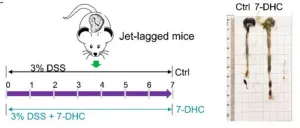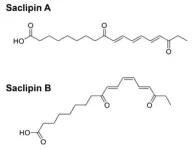Gut microbiota-derived 7-DHC ameliorates circadian rhythm disorders and inflammatory bowel disease (IBD)
2023-10-20
(Press-News.org)
Inflammatory bowel disease (IBD) is a chronic inflammatory disease of the gastrointestinal tract categorized into ulcerative colitis and Crohn's disease. Currently, aminosalicylates, glucocorticoids, immunomodulating drugs, and biological agents are common strategies for the treatment of IBD. The efficacy of these therapies is limited, however, and they are frequently associated with multiple adverse effects.
Recently, Life Metabolism published a study entitled “7-Dehydrocholesterol protects against circadian disruption and experimental colitis: potential role of RORα/γ”, which shows that gut microbiota-derived metabolite 7-dehydrocholesterol (7-DHC) acts as a circadian rhythm regulator and ameliorates experimental colitis by targeting RORα/γ to combat circadian rhythm disruption (Figure 1).
By screening a library of gut microbiota-derived metabolites with 810 small molecules, the authors found that 7-DHC can regulate circadian rhythms both in vitro and in a jet-lagged mouse model. Importantly, 7-DHC ameliorates colitis induced by dextran sulfate sodium (DSS) in jet-lagged mice by directly targeting both RORα and RORγ, thereby affecting the expression of the downstream clock genes in a vitamin D-independent manner. Overall, this study reveals that gut microbiota-derived molecule 7-DHC is a potential therapeutic agent for IBD by modulating circadian rhythm, providing a novel idea for further research and development of novel IBD therapeutics.
Inflammatory bowel disease (IBD) is a chronic inflammatory disease of the gastrointestinal tract categorized into ulcerative colitis and Crohn's disease. Currently, aminosalicylates, glucocorticoids, immunomodulating drugs, and biological agents are common strategies for the treatment of IBD. The efficacy of these therapies is limited, however, and they are frequently associated with multiple adverse effects.
Recently, Life Metabolism published a study entitled “7-Dehydrocholesterol protects against circadian disruption and experimental colitis: potential role of RORα/γ”, which shows that gut microbiota-derived metabolite 7-dehydrocholesterol (7-DHC) acts as a circadian rhythm regulator and ameliorates experimental colitis by targeting RORα/γ to combat circadian rhythm disruption (Figure 1).
By screening a library of gut microbiota-derived metabolites with 810 small molecules, the authors found that 7-DHC can regulate circadian rhythms both in vitro and in a jet-lagged mouse model. Importantly, 7-DHC ameliorates colitis induced by dextran sulfate sodium (DSS) in jet-lagged mice by directly targeting both RORα and RORγ, thereby affecting the expression of the downstream clock genes in a vitamin D-independent manner. Overall, this study reveals that gut microbiota-derived molecule 7-DHC is a potential therapeutic agent for IBD by modulating circadian rhythm, providing a novel idea for further research and development of novel IBD therapeutics.
END
[Attachments] See images for this press release:


ELSE PRESS RELEASES FROM THIS DATE:
2023-10-20
The cosmetics industry is turning towards natural alternatives to chemical agents used in products to pave way towards a more sustainable future. Researchers are searching for nature-derived active ingredients for skincare products through extensive bioprospecting research. In this regard, cyanobacteria, with their remarkable metabolic capacity, are a promising source of such agents. Having existed on Earth for nearly 3.5 billion years, these photosynthetic organisms have adapted to various environmental ...
2023-10-20
Consistently sleeping less than five hours a night might raise the risk of developing depressive symptoms, according to a new genetic study led by UCL (University College London) researchers.
Historically, poor sleep has been seen as a side effect of mental ill health, but this study found that the link between sleep and mental illness is more complex.
The study, published in the journal Translational Psychiatry, analysed data from people with an average age of 65 and found short sleep was associated with the onset of depressive symptoms.
Lead author Odessa S. Hamilton (UCL Institute of Epidemiology ...
2023-10-20
Dzemila Sero, now Migelien Gerritzen Fellow at the Rijksmuseum and former postdoc at the Centrum Wiskunde & Informatica, together with a team of researchers from the Rijksmuseum, Leiden and Cambridge University, examined the terracotta sculpture Study for a Hovering Putto attributed to Laurent Delvaux (1696 - 1778) and housed in the Rijksmuseum permanent collection.
The methodology and findings were published open access in Science Advances in a paper with title "Artist profiling using micro-CT scanning of a Rijksmuseum terracotta sculpture".
To acquire preserved impressions on the sculpture, researchers ...
2023-10-20
Researchers at Baylor College of Medicine and the University of Michigan conducted a phase I pilot study to assess the feasibility of using potato starch as a dietary intervention to modify the gut microbiome in bone marrow transplant patients. The study, which appears in the journal Nature Medicine, is the first part of a two-phase ongoing clinical trial evaluating the effect of modifying the microbiome on the incidence of graft-versus-host disease (GVHD), a major complication that develops in up to half ...
2023-10-20
Artificial intelligence (AI)—of ChatGPT fame—is increasingly used in medicine to improve diagnosis and treatment of diseases, and to avoid unnecessary screening for patients. But AI medical devices could also harm patients and worsen health inequities if they are not designed, tested, and used with care, according to an international task force that included a University of Rochester Medical Center bioethicist.
Jonathan Herington, PhD, was a member of the AI Task Force of the Society for Nuclear Medicine and Medical Imaging, which laid out recommendations on how to ethically develop and use AI medical devices in two papers published ...
2023-10-20
Pregnant people who gained more than the now-recommended amount of weight had a higher risk of death from heart disease or diabetes in the decades that followed, according to new analysis of 50 years of data published in The Lancet and led by researchers from the Perelman School of Medicine at the University of Pennsylvania. The group studied a large national data set that stretched from when a person gave birth through the next five decades, assessing mortality rates to show the potential long-term effects of weight gain in pregnancy. Higher risk of death was found for all weight groups studied — including those defined ...
2023-10-20
A first-of-its kind hormone replacement therapy that more closely replicates the natural circadian and ultradian rhythms of our hormones has shown to improve symptoms in patients with adrenal conditions. Results from the University of Bristol-led clinical trial are published today [20 October] in the Journal of Internal Medicine.
Low levels of a key hormone called ‘cortisol’ is typically a result of conditions such as Addison's and Congenital Adrenal Hyperplasia. The hormone regulates a range of vital processes, ...
2023-10-19
URBANA, Ill. – Married couples and long-term romantic partners typically engage in a variety of behaviors that sustain and nourish the relationship. These actions promote higher levels of commitment, which benefits couples’ physical and psychological health. A new study from the University of Illinois Urbana-Champaign looks at how such relationship maintenance behaviors interact with satisfaction and commitment.
“Relationship maintenance is a well-established measure of couple behavior. In our study, we measured it with five main categories, ...
2023-10-19
NASA’s James Webb Space Telescope has discovered a new, never-before-seen feature in Jupiter’s atmosphere. The high-speed jet stream, which spans more than 3,000 miles (4,800 kilometers) wide, sits over Jupiter’s equator above the main cloud decks. The discovery of this jet is giving insights into how the layers of Jupiter’s famously turbulent atmosphere interact with each other, and how Webb is uniquely capable of tracking those features.
“This is something that totally surprised us,” said Ricardo Hueso of the University of the Basque Country in Bilbao, Spain, lead author on the paper ...
2023-10-19
ABSTRACTS: LBA71, 1088MO, 95MO, LBA48, 1082O, 1085O, LBA34, 243MO
MADRID ― The University of Texas MD Anderson Cancer Center’s Research Highlights provides a glimpse into recent basic, translational and clinical cancer research from MD Anderson experts.
This special edition features upcoming oral presentations by MD Anderson researchers at the 2023 European Society for Medical Oncology (ESMO) Congress focused on clinical advances across a variety of cancer types. Highlights include a combination strategy for EGFR-mutant metastatic lung cancer, updated results for a Phase ...
LAST 30 PRESS RELEASES:
[Press-News.org] Gut microbiota-derived 7-DHC ameliorates circadian rhythm disorders and inflammatory bowel disease (IBD)




